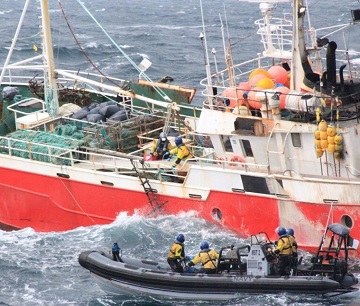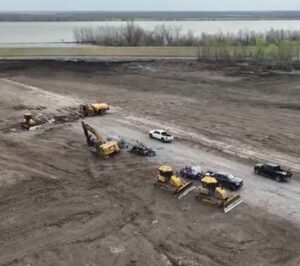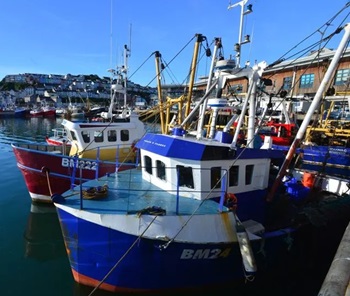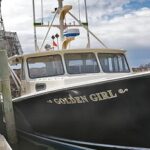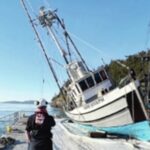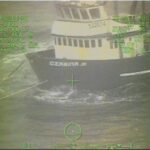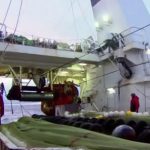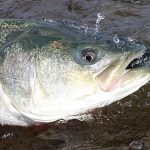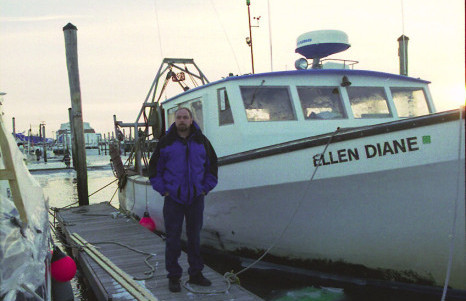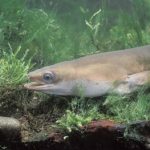Monthly Archives: November 2024
What happened to the 3,000 pounds of haddock seized in a fish-plant bust?
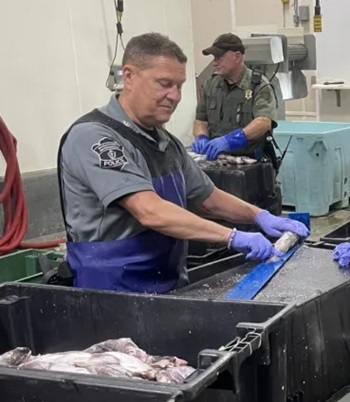 Acting Colonel Patrick Moran of the Massachusetts Environmental Police had a problem: 3,000 pounds of confiscated haddock on the New Bedford waterfront. The law against undersized catch had been enforced, but now what? Out of a total load of 11,000 pounds that came off the boat, the seized fish had come up short of the required 16-inch length, Moran said at the time. Seized on Thursday, June 20, as Moran was making rounds of local fish processing houses, there it sat in a plant that the MEP declined to name. He knew Shelley Edmundson, a founding member and executive director of the Martha’s Vineyard Fishermen’s Preservation Trust, a nonprofit devoted to sustaining the island’s fishing culture. He made a call. His timing could have been better, and it could have been worse. But, this big load of haddock would be complicated, she said. more, >>CLICK TO READ<< 15:54
Acting Colonel Patrick Moran of the Massachusetts Environmental Police had a problem: 3,000 pounds of confiscated haddock on the New Bedford waterfront. The law against undersized catch had been enforced, but now what? Out of a total load of 11,000 pounds that came off the boat, the seized fish had come up short of the required 16-inch length, Moran said at the time. Seized on Thursday, June 20, as Moran was making rounds of local fish processing houses, there it sat in a plant that the MEP declined to name. He knew Shelley Edmundson, a founding member and executive director of the Martha’s Vineyard Fishermen’s Preservation Trust, a nonprofit devoted to sustaining the island’s fishing culture. He made a call. His timing could have been better, and it could have been worse. But, this big load of haddock would be complicated, she said. more, >>CLICK TO READ<< 15:54
A lobster season Q&A: Supply and demand, price volatility and challenges in markets
 It’s never smooth sailing for the Atlantic Canada lobster industry. Each year there are issues and challenges to contend with. The weather and catches are beyond anyone’s control. But the one constant is how important this industry is economically to the region, and to the communities that rely on it. Tasked with such things as marketing and advocacy of the industry is the Lobster Council of Canada. In this Q&A, the council’s executive director, Geoff Irvine, talks about the industry, the upcoming lobster season in southwestern Nova Scotia, and the challenges that continue to stack up on the menu. Q: How does the fall opening of the LFA 33 and 34 districts look in comparison to previous seasons? more, >>CLICK TO READ<< 08:28
It’s never smooth sailing for the Atlantic Canada lobster industry. Each year there are issues and challenges to contend with. The weather and catches are beyond anyone’s control. But the one constant is how important this industry is economically to the region, and to the communities that rely on it. Tasked with such things as marketing and advocacy of the industry is the Lobster Council of Canada. In this Q&A, the council’s executive director, Geoff Irvine, talks about the industry, the upcoming lobster season in southwestern Nova Scotia, and the challenges that continue to stack up on the menu. Q: How does the fall opening of the LFA 33 and 34 districts look in comparison to previous seasons? more, >>CLICK TO READ<< 08:28

Beloved MS Coast Hall of Fame shrimper remembered as kind, humble and ‘full of grace’
Day after day, Richard Kopszywa shrimped from his old wooden boat named F/V Linda K, and carefully repaired it so the vessel still ran after decades. “He used to tell me, ‘If I can’t shrimp or if I can’t get out on the water, I think I will probably just die,” his wife, Shelley Kopszywa, said. “It was in his veins.” Now, his family is grieving after authorities found Kopszywa near Deer Island last week, two days after his wife reported him missing and the Coast Guard found the Linda K empty, five miles from shore. Shelley Kopszywa said she believes her husband died doing what he loved, so she is at peace. Kopszywa was humble, his wife said, and probably would not have liked all this attention. But she loves him too much to listen. He was the kind of man who helped her down the steps, she said, and always opened the door for her. “Full of grace,” she said. more, >>CLICK TO READ<< 06:47
Salvage efforts remove fishing tug from Stokes Bay waters
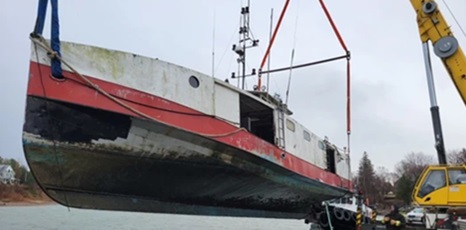 The Coast Guard refloated the FV Gary M at the Stokes Bay dock for the second time in less than three months, but this time it was taken to Southampton and put on dry land. The fishing tug was lifted out on Nov. 26, as shown in a Coast Guard photo, and was placed on the government pier in Southampton, at the mouth of the Saugeen River. It was reported partly sunk Nov. 20 in Stokes Bay. It remained in Southampton Thursday. more, >>CLICK TO READ<<
The Coast Guard refloated the FV Gary M at the Stokes Bay dock for the second time in less than three months, but this time it was taken to Southampton and put on dry land. The fishing tug was lifted out on Nov. 26, as shown in a Coast Guard photo, and was placed on the government pier in Southampton, at the mouth of the Saugeen River. It was reported partly sunk Nov. 20 in Stokes Bay. It remained in Southampton Thursday. more, >>CLICK TO READ<<
Climate change makes winners and losers out of cod and snow crab, says scientist
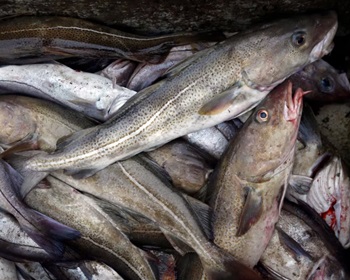 A team of scientists used modelling to look into the effects of climate change on three Grand Banks fish species. They anticipate that warmer waters could lead to biomass declines for snow crab and yellowtail flounder but gains for Atlantic cod. “That’s one thing that we see when we’re looking at the impacts of climate change on marine ecosystems and oceans, is that there are winners and losers. So it’s not as though everything is going to be negatively impacted,” said Tyler Eddy, a scientist with Marine Institute’s Centre for Fisheries Ecosystems Research. Species that thrive or struggle in these scenarios will depend on their thermal preferences and changes in a region, he said, adding a specific species might also leave a region to follow their preferred temperature. more, >>CLICK TO READ<< 10:06
A team of scientists used modelling to look into the effects of climate change on three Grand Banks fish species. They anticipate that warmer waters could lead to biomass declines for snow crab and yellowtail flounder but gains for Atlantic cod. “That’s one thing that we see when we’re looking at the impacts of climate change on marine ecosystems and oceans, is that there are winners and losers. So it’s not as though everything is going to be negatively impacted,” said Tyler Eddy, a scientist with Marine Institute’s Centre for Fisheries Ecosystems Research. Species that thrive or struggle in these scenarios will depend on their thermal preferences and changes in a region, he said, adding a specific species might also leave a region to follow their preferred temperature. more, >>CLICK TO READ<< 10:06
Trawlerman Jimmy Buchan: I earned £12 fishing 6 days a week at 14
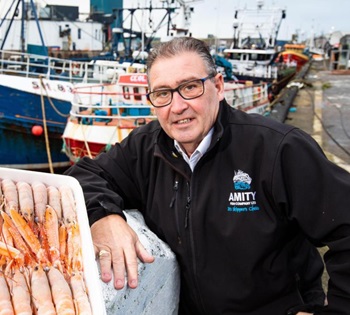 Jimmy Buchan appeared in the Bafta-winning BBC series Trawlermen (2006-10) and published his memoir, Trawlerman: Life at the Helm of the Toughest Job in Britain, in 2011. The former skipper of Amity II has 40 years’ experience of North Sea fishing and has been running his own seafood supply company, Amity Fish, since 2019. Now 64, he is the chief executive of the Scottish Seafood Association and still lives in his home town of Peterhead, Aberdeenshire, with his wife, Irene. They have two grown-up daughters, Jenna and Amy. Photos, more, >>CLICK TO READ<< 08:29
Jimmy Buchan appeared in the Bafta-winning BBC series Trawlermen (2006-10) and published his memoir, Trawlerman: Life at the Helm of the Toughest Job in Britain, in 2011. The former skipper of Amity II has 40 years’ experience of North Sea fishing and has been running his own seafood supply company, Amity Fish, since 2019. Now 64, he is the chief executive of the Scottish Seafood Association and still lives in his home town of Peterhead, Aberdeenshire, with his wife, Irene. They have two grown-up daughters, Jenna and Amy. Photos, more, >>CLICK TO READ<< 08:29
Continuation of lobster quality and moult survey very important to southwestern NS industry
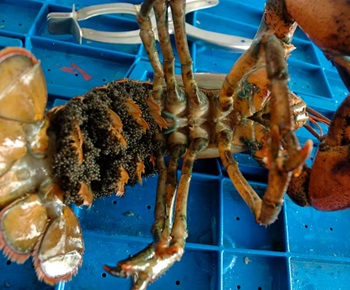 Every fall since 2005, in advance of the commercial lobster fishery opening in Lobster Fishing Areas (LFA) 33 and 34, a scientific survey has been conducted in the waters around southwestern Nova Scotia. “The overall objective of the Atlantic Lobster Moult and Quality (ALMQ) Survey is to develop an ongoing monitoring program, based on biological indicators of moult-timing, quality and environmental conditions, to predict the quality of lobsters at the start of the lobster seasons in LFAs 33 and 34,” says Heather Mulock, executive director of the Coldwater Lobster Association. “The data collected is used to establish a framework for adaptation decision-making for the lobster sector, including ensuring better product marketability, live storage, and international shipping valuation.” more, >>CLICK TO READ<< 07:10
Every fall since 2005, in advance of the commercial lobster fishery opening in Lobster Fishing Areas (LFA) 33 and 34, a scientific survey has been conducted in the waters around southwestern Nova Scotia. “The overall objective of the Atlantic Lobster Moult and Quality (ALMQ) Survey is to develop an ongoing monitoring program, based on biological indicators of moult-timing, quality and environmental conditions, to predict the quality of lobsters at the start of the lobster seasons in LFAs 33 and 34,” says Heather Mulock, executive director of the Coldwater Lobster Association. “The data collected is used to establish a framework for adaptation decision-making for the lobster sector, including ensuring better product marketability, live storage, and international shipping valuation.” more, >>CLICK TO READ<< 07:10
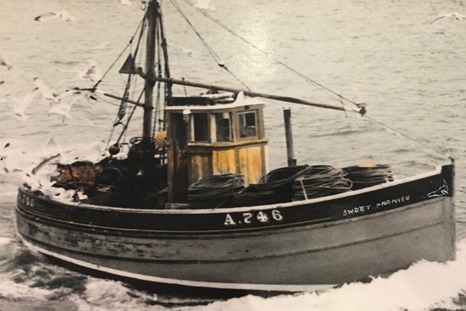
Launched as Sweet Promise A 746 in 1965, this Noble’s-built stalwart, Tern LH 53, has clocked up almost 60 years’ service
The 33ft Tern, which today is based at Port Seton, was built in 1965 by Jimmy Noble as Sweet Promise A 746 for Robbie Cormack and Ian Balgowan of Stonehaven, at a cost of £6,000. At the time she was unique, said Ian, as she had a wheelhouse amidships with a winch behind. According to the Noble build lists, she was built for ‘Mr Cormack’ – but she was originally registered to Ian. Gordon told me he imagined she had been built for the boatbuilder’s son, as ‘she was built like a brick shithouse, larch on oak’. The frames were so close together, he said, that back aft on the return you could not see the planks. Gordon continued: “She was tough as they come, so I rigged her for scallops with three dredges each side and worked mainly in Falmouth Bay, away from the Looe fleet, close inshore. Best catch was just over 800 dozen for a trip. Photos, more, >>CLICK TO READ<< 13:44
Donegal fishermen frustrated as general election looms: ‘We are the fish basket of Europe, yet we’re the poor relation’
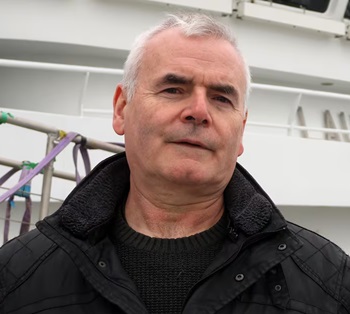 This should be the busiest time of year. Pelagic fish, the species found near the surface of the ocean, are most plentiful in the North Atlantic from late autumn to early summer. The season peaks either side of Christmas, but every fishing vessel is tied up at the pier. Local fisherman Denis Carbery landed 1,100 tonnes of mackerel last month from his trawler, Lauren, and that was it for the year; he will not take to sea again until January. Charlie Doherty’s fishing vessel Áine has not gone to sea since March because of quotas. It’s an impressive vessel, just seven years old. Doherty is scathing of all the political parties, wondering why there are no Irish MEPs on the EU fisheries committee while Hungary, a landlocked country, has representatives on it. more, >>CLICK TO READ<< 09:38
This should be the busiest time of year. Pelagic fish, the species found near the surface of the ocean, are most plentiful in the North Atlantic from late autumn to early summer. The season peaks either side of Christmas, but every fishing vessel is tied up at the pier. Local fisherman Denis Carbery landed 1,100 tonnes of mackerel last month from his trawler, Lauren, and that was it for the year; he will not take to sea again until January. Charlie Doherty’s fishing vessel Áine has not gone to sea since March because of quotas. It’s an impressive vessel, just seven years old. Doherty is scathing of all the political parties, wondering why there are no Irish MEPs on the EU fisheries committee while Hungary, a landlocked country, has representatives on it. more, >>CLICK TO READ<< 09:38
‘A lot of anxiety’: N.L. seafood industry will see big hit if Trump follows through with tariffs
 President-elect Donald Trump’s 25 per cent tariff threat is worrying people in Newfoundland and Labrador’s seafood industry. More than 60 per cent of the province’s seafood is sold in the United States. “There’s certainly a lot of anxiety right now in the seafood industry, and I’m no exception,” said Labrador Gem Seafoods’ president Danny Dumaresque in an interview with The Telegram on Wednesday, Nov. 27. Trump said in a social media post Monday night that on his first day in office, he would impose the tariffs until Canada and Mexico stop illegal border crossings and prevent drugs such as fentanyl from entering the U.S. “Both Mexico and Canada have the absolute right and power to easily solve this long simmering problem. We hereby demand that they use this power, and until such time that they do, it is time for them to pay a very big price!” Trump wrote on his social media platform Truth Social. more, >>CLICK TO READ<< 07:57
President-elect Donald Trump’s 25 per cent tariff threat is worrying people in Newfoundland and Labrador’s seafood industry. More than 60 per cent of the province’s seafood is sold in the United States. “There’s certainly a lot of anxiety right now in the seafood industry, and I’m no exception,” said Labrador Gem Seafoods’ president Danny Dumaresque in an interview with The Telegram on Wednesday, Nov. 27. Trump said in a social media post Monday night that on his first day in office, he would impose the tariffs until Canada and Mexico stop illegal border crossings and prevent drugs such as fentanyl from entering the U.S. “Both Mexico and Canada have the absolute right and power to easily solve this long simmering problem. We hereby demand that they use this power, and until such time that they do, it is time for them to pay a very big price!” Trump wrote on his social media platform Truth Social. more, >>CLICK TO READ<< 07:57
South Carolina shrimpers applaud decision to impose duties on shrimp imported from four countries
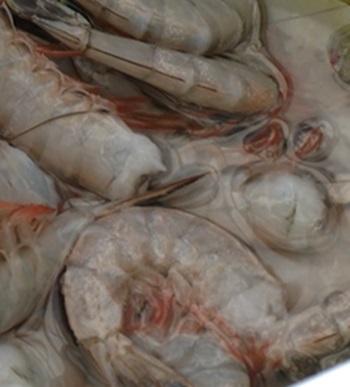 South Carolina shrimpers are celebrating the U.S. International Trade Commission’s recent decision to crack down on frozen shrimp imports from four countries. The ITC voted in favor of issuing countervailing duties on frozen, warm-water shrimp imports from Ecuador, India, and Vietnam after the U.S. Department of Commerce determined those governments were illegally subsidizing the industry. “We’re grateful because it’s an acknowledgment of what we feel and we experience in the industry and we see on a daily basis,” said Bryan Jones, a first-generation shrimper who lives in McClellanville. Jones serves as vice president of the South Carolina Shrimpers Association and was among a group of commercial fishermen who testified before the ITC in Washington, D.C. in October. more, >>CLICK TO READ<< 14:20
South Carolina shrimpers are celebrating the U.S. International Trade Commission’s recent decision to crack down on frozen shrimp imports from four countries. The ITC voted in favor of issuing countervailing duties on frozen, warm-water shrimp imports from Ecuador, India, and Vietnam after the U.S. Department of Commerce determined those governments were illegally subsidizing the industry. “We’re grateful because it’s an acknowledgment of what we feel and we experience in the industry and we see on a daily basis,” said Bryan Jones, a first-generation shrimper who lives in McClellanville. Jones serves as vice president of the South Carolina Shrimpers Association and was among a group of commercial fishermen who testified before the ITC in Washington, D.C. in October. more, >>CLICK TO READ<< 14:20
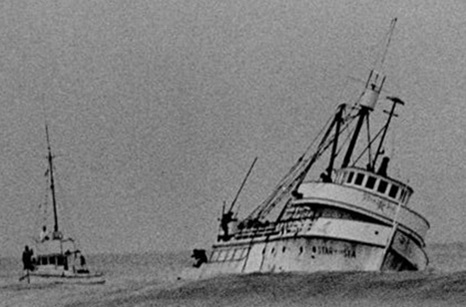
How a few daring moves saved the crew of the Star of the Sea tuna boat in a 1961 accident
In the predawn hours of Oct. 4, 1961, a tuna clipper en route to San Diego ran aground off Point Arena in dense fog. The 108-foot Star of the Sea — with an 11-man crew and 160 tons of tuna aboard — was returning from a nine-week fishing voyage near Newport, Oregon. As it arrived in the small coastal city of Point Arena, between Sea Ranch and Manchester in Mendocino County, the vessel’s navigational system went out amid unnavigable fog and turbulent waters. The Oct. 4, 1961, Oakland Tribune reported the crew fought to control the ship, then the captain, identified as Andrew Baity, deliberately grounded it on sand to prevent it from smashing into nearby rocks. With the vessel’s two dories lost in the heavy sea and no immediate rescue on the way, the crew was stuck and helpless. Then, crewman John Dutra made a dramatic pursuit for aid. photo gallery, more, >>CLICK TO READ<< 10:07
And they’re off! The 2024-25 lobster season in southwestern Nova Scotia opens with Dumping Day
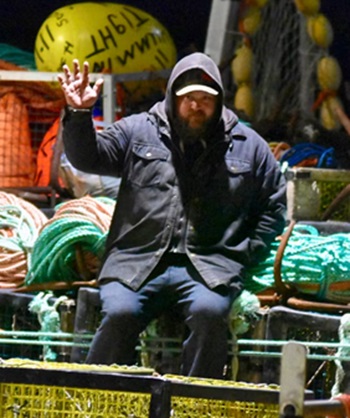 Following a one-day weather delay, the six-month commercial lobster fishery in southwestern Nova Scotia and along the province’s south shore opened on the morning of Nov. 26 with light winds to send off the crews. Referred to as Dumping Day, here are some photos from parts of Yarmouth County as boats left their wharfs and harbours in LFA 34 to head to the fishing grounds. The season started at 5 a.m., which is an hour earlier than normal, to capitalize on the lighter winds. Lots of photos, more, >>CLICK TO READ<< 08:06
Following a one-day weather delay, the six-month commercial lobster fishery in southwestern Nova Scotia and along the province’s south shore opened on the morning of Nov. 26 with light winds to send off the crews. Referred to as Dumping Day, here are some photos from parts of Yarmouth County as boats left their wharfs and harbours in LFA 34 to head to the fishing grounds. The season started at 5 a.m., which is an hour earlier than normal, to capitalize on the lighter winds. Lots of photos, more, >>CLICK TO READ<< 08:06
Athearn Marine Agency Boat of the Week: 42′ H&H Lobster Boat, 550HP John Deere Diesel
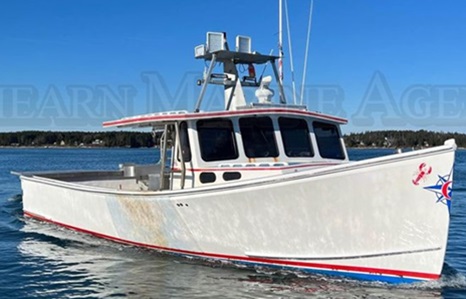 To review specifications, information, and 27 photos’, >click here<. To see all the boats in this series >click here< 06:02
To review specifications, information, and 27 photos’, >click here<. To see all the boats in this series >click here< 06:02
UPDATE: Body found in Biloxi identified as missing 75-year-old shrimper
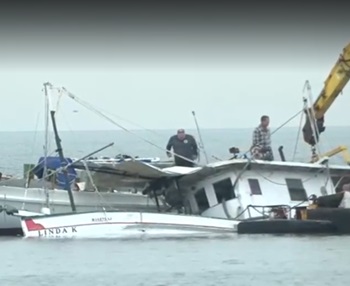 Harrison County Coroner Brian Switzer says the body found Tuesday morning between Biloxi Beach and Deer Island is missing shrimper Richard Kopszywa. The 75-year-old Biloxi man went missing from the F/V Linda K shrimp boat. The boat sank while being towed to shore near the western tip of Deer Island. Three days earlier, Ricky Kopszywa took his shrimp boat out to fill some last-minute orders for Thanksgiving, his family said. When his wife didn’t hear from him Sunday, she reported him missing. The Coast Guard found his boat, the Linda K, five miles offshore. The boat passed down from Ricky’s father was named after Ricky’s oldest sister. Video, more, >>CLICK TO READ<< 20:35
Harrison County Coroner Brian Switzer says the body found Tuesday morning between Biloxi Beach and Deer Island is missing shrimper Richard Kopszywa. The 75-year-old Biloxi man went missing from the F/V Linda K shrimp boat. The boat sank while being towed to shore near the western tip of Deer Island. Three days earlier, Ricky Kopszywa took his shrimp boat out to fill some last-minute orders for Thanksgiving, his family said. When his wife didn’t hear from him Sunday, she reported him missing. The Coast Guard found his boat, the Linda K, five miles offshore. The boat passed down from Ricky’s father was named after Ricky’s oldest sister. Video, more, >>CLICK TO READ<< 20:35
Commercial Fisherman/U. S. Army Veteran Jack Benton Cartwright of Oregon has passed away
 Jack Benton Cartwright was well known for his kindness and enthusiasm for life. He was a force of nature, and many have described him as “one of a kind.” Jack was born March 16, 1944, to Charlie and Okema Cartwright. He was raised on the Seaside Golf Course, which his parents owned until 1971. Jack graduated from Seaside High School in 1962, and shortly after he joined the U.S. Army. When he returned, he began logging in Alaska before starting his career as a commercial fisherman. After a few years of fishing, he and David Kelly bought the Arrow, and were exceptional halibut longliners. In 1979 he met Jane, who was working in Seward, Alaska, and was interested in fishing. In 1986, they bought an 80-foot steel boat and named it Kema Sue, in honor of his late mother and sister. Jack and Jane were married in front of family and friends, at a fun-loving celebration at Little Beach in Gearhart. more, >>CLICK TO READ<< 14:39
Jack Benton Cartwright was well known for his kindness and enthusiasm for life. He was a force of nature, and many have described him as “one of a kind.” Jack was born March 16, 1944, to Charlie and Okema Cartwright. He was raised on the Seaside Golf Course, which his parents owned until 1971. Jack graduated from Seaside High School in 1962, and shortly after he joined the U.S. Army. When he returned, he began logging in Alaska before starting his career as a commercial fisherman. After a few years of fishing, he and David Kelly bought the Arrow, and were exceptional halibut longliners. In 1979 he met Jane, who was working in Seward, Alaska, and was interested in fishing. In 1986, they bought an 80-foot steel boat and named it Kema Sue, in honor of his late mother and sister. Jack and Jane were married in front of family and friends, at a fun-loving celebration at Little Beach in Gearhart. more, >>CLICK TO READ<< 14:39
Dumping day begins in southwestern Nova Scotia with calm conditions
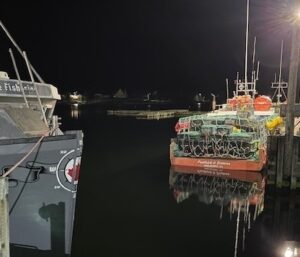 Dumping day began with much fanfare in southwestern Nova Scotia early Tuesday morning. Fireworks signaled the start of the commercial lobster season in Sambro, with loved ones waving goodbye from the wharf where crowds gathered to see the fishers off. “It’s an exciting morning, we always all come down and watch the fireworks, as they go out, it’s a pretty big day for everybody,” said Briana Beaver, whose partner is a fisher. Dumping day for lobster fishing areas 33 and 34 is typically the final Monday of November, but there was a one-day delay this year due to rough weather. While conditions were calm Tuesday, boats that work in LFA 34, which extends from Shelburne County around the southwest coast of the province, were allowed to leave a bit earlier at 5 a.m. Photos, Video, more, >>CLICK TO READ<< 10:30
Dumping day began with much fanfare in southwestern Nova Scotia early Tuesday morning. Fireworks signaled the start of the commercial lobster season in Sambro, with loved ones waving goodbye from the wharf where crowds gathered to see the fishers off. “It’s an exciting morning, we always all come down and watch the fireworks, as they go out, it’s a pretty big day for everybody,” said Briana Beaver, whose partner is a fisher. Dumping day for lobster fishing areas 33 and 34 is typically the final Monday of November, but there was a one-day delay this year due to rough weather. While conditions were calm Tuesday, boats that work in LFA 34, which extends from Shelburne County around the southwest coast of the province, were allowed to leave a bit earlier at 5 a.m. Photos, Video, more, >>CLICK TO READ<< 10:30
New England labor unions call for faster offshore wind buildout
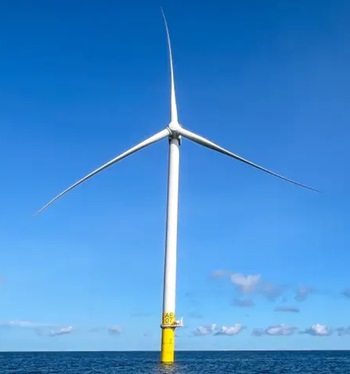 “We looked at the way this industry was starting to develop and thought to ourselves: How can we work as a labor movement to make sure we’re making this an industry that is not only going to benefit the climate but benefit our members?” (read the report) said Patrick Crowley, president of the Rhode Island chapter of the American Federation of Labor and Congress of Industrial Organizations (AFL-CIO), which represents roughly 900,000 union members across the three states. Crowley and the AFL-CIO partnered with the Climate Jobs National Resource Center and unions in Massachusetts and Connecticut to put together the new report, which outlines how the industry can expand with organized labor at the forefront. To begin with, the union report suggests that the states aim higher for their offshore wind goals in order to boost the region’s economy and take full advantage of their unique access to wind. more, >>CLICK TO READ<< 09:25
“We looked at the way this industry was starting to develop and thought to ourselves: How can we work as a labor movement to make sure we’re making this an industry that is not only going to benefit the climate but benefit our members?” (read the report) said Patrick Crowley, president of the Rhode Island chapter of the American Federation of Labor and Congress of Industrial Organizations (AFL-CIO), which represents roughly 900,000 union members across the three states. Crowley and the AFL-CIO partnered with the Climate Jobs National Resource Center and unions in Massachusetts and Connecticut to put together the new report, which outlines how the industry can expand with organized labor at the forefront. To begin with, the union report suggests that the states aim higher for their offshore wind goals in order to boost the region’s economy and take full advantage of their unique access to wind. more, >>CLICK TO READ<< 09:25

Shot fired into lobster buyer’s home as southwest N.S. season opens
Commercial fishermen set to start the lucrative lobster fishery in southwest Nova Scotia on Tuesday morning are boycotting buyers alleged to be profiteering off the unlicensed summer fishery in St. Mary’s Bay. On Saturday night, one of the buyers those fishermen in lobster fishing areas 33 and 34 have turned to have a shot fired through his home. On Sunday morning, Geoffrey Jobert, owner of Lobster Hub Inc. in Meteghan, went downstairs in his Clare County home and found a series of holes passing through his garage door, kitchen, dining room and living room. He found a round lodged in his hardwood rocking chair. “It was stormy the night before and we didn’t hear the shot,” said Jobert. On the road outside, he said, he found a spent shell casing. While there was no message left, Jobert said he knows why he’s being threatened. more, >>CLICK TO READ<< 07:18
Coast Guard searching for 75-year-old shrimper after abandoned ship found off Biloxi coast
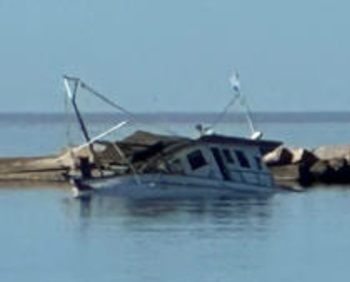 The U.S. Coast Guard is searching for a missing shrimper after his boat, the F/V Linda K, was found Sunday morning with no one on board. According to Ensign William Winston with the U.S. Coast Guard Mobile Station, the 75-year-old man was reported missing by his wife Sunday morning after she didn’t hear from him. The shrimper’s wife told officials he usually checks in daily when he’s out shrimping. The Coast Guard located the shrimp boat about five miles off the coast of Biloxi. The boat sunk while being towed to shore near the western tip of Deer Island. more, >>CLICK TO READ<< 06:18
The U.S. Coast Guard is searching for a missing shrimper after his boat, the F/V Linda K, was found Sunday morning with no one on board. According to Ensign William Winston with the U.S. Coast Guard Mobile Station, the 75-year-old man was reported missing by his wife Sunday morning after she didn’t hear from him. The shrimper’s wife told officials he usually checks in daily when he’s out shrimping. The Coast Guard located the shrimp boat about five miles off the coast of Biloxi. The boat sunk while being towed to shore near the western tip of Deer Island. more, >>CLICK TO READ<< 06:18
Alaska’s total commercial salmon harvest this year was ultra-low in both quantity and value
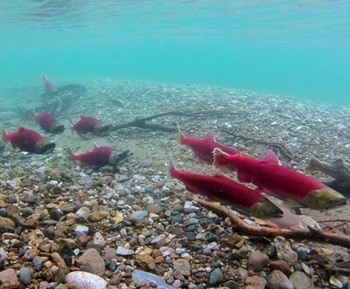 The number of Alaska salmon harvested by commercial fishers was the third smallest since all-species records began in 1985, and the value to harvesters, when adjusted for inflation, was the lowest reported since 1975, state officials said. Additionally, the 450 million pounds of salmon that the total harvest contained was the lowest on record, officials said. The totals come from a preliminary recap of this year’s salmon season issued on Nov. 18 by the Alaska Department of Fish and Game. Only 101.2 million salmon were harvested this year, less than half the 232.2 million harvested last year, the department reported. The money paid to fishers for their catches, known as ex-vessel value, totaled $304 million, down from $398 million last year, the department said, In the Bristol Bay region, site of the world’s biggest sockeye runs, this year’s return was well above projections and 7% higher than the 20-year average, though the amount commercially harvested was a bit below the average. more, >>CLICK TO READ<< 16:09
The number of Alaska salmon harvested by commercial fishers was the third smallest since all-species records began in 1985, and the value to harvesters, when adjusted for inflation, was the lowest reported since 1975, state officials said. Additionally, the 450 million pounds of salmon that the total harvest contained was the lowest on record, officials said. The totals come from a preliminary recap of this year’s salmon season issued on Nov. 18 by the Alaska Department of Fish and Game. Only 101.2 million salmon were harvested this year, less than half the 232.2 million harvested last year, the department reported. The money paid to fishers for their catches, known as ex-vessel value, totaled $304 million, down from $398 million last year, the department said, In the Bristol Bay region, site of the world’s biggest sockeye runs, this year’s return was well above projections and 7% higher than the 20-year average, though the amount commercially harvested was a bit below the average. more, >>CLICK TO READ<< 16:09
Port of Galilee and Marine Facilities to Undergo Major Upgrades with $15M FEMA Grant
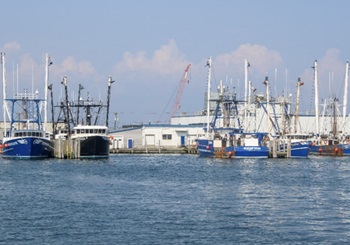 In a landmark step toward mitigating the impacts of climate change, Rhode Island has secured a $15.5 million grant from the Federal Emergency Management Agency (FEMA), the largest award of its kind in the state’s history. The funds will support a $17.2 million initiative to elevate critical infrastructure at the Port of Galilee in Narragansett and Wickford Dock, along with the replacement of eight docks across three state-managed marine facilities. The grant, matched with state funding, was announced by the Rhode Island Department of Environmental Management (DEM), the Rhode Island Emergency Management Agency (RIEMA), and the state’s Congressional Delegation. It aims to bolster resilience against rising sea levels, coastal flooding, and extreme weather events. The Port of Galilee, a vital economic engine for Rhode Island and the 13th highest value fishing port in the nation, is at the heart of the initiative. more, >>CLICK TO READ<< 14:39
In a landmark step toward mitigating the impacts of climate change, Rhode Island has secured a $15.5 million grant from the Federal Emergency Management Agency (FEMA), the largest award of its kind in the state’s history. The funds will support a $17.2 million initiative to elevate critical infrastructure at the Port of Galilee in Narragansett and Wickford Dock, along with the replacement of eight docks across three state-managed marine facilities. The grant, matched with state funding, was announced by the Rhode Island Department of Environmental Management (DEM), the Rhode Island Emergency Management Agency (RIEMA), and the state’s Congressional Delegation. It aims to bolster resilience against rising sea levels, coastal flooding, and extreme weather events. The Port of Galilee, a vital economic engine for Rhode Island and the 13th highest value fishing port in the nation, is at the heart of the initiative. more, >>CLICK TO READ<< 14:39
N.C. Division of Marine Fisheries sinks trawler at artificial reef site off Cape Lookout
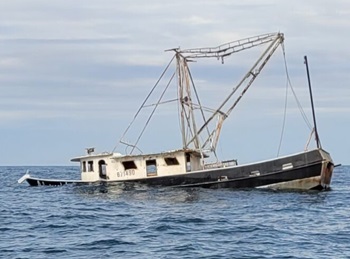 The state Artificial Reef Program sank a 55-foot trawler at the artificial reef site, AR-305, off Cape Lookout, last week. The program is part of the North Carolina Department of Environmental Quality’s Division of Marine Fisheries. The fishing vessel Alexandria Dawn, the latest addition to the artificial reef, was built in 1984, but has been out of use for around a decade, division officials announced Monday. Before sinking, the vessel was cleaned extensively in accordance with Environmental Protection Agency requirements, officials said. more, >>CLICK TO READ<< 12:14
The state Artificial Reef Program sank a 55-foot trawler at the artificial reef site, AR-305, off Cape Lookout, last week. The program is part of the North Carolina Department of Environmental Quality’s Division of Marine Fisheries. The fishing vessel Alexandria Dawn, the latest addition to the artificial reef, was built in 1984, but has been out of use for around a decade, division officials announced Monday. Before sinking, the vessel was cleaned extensively in accordance with Environmental Protection Agency requirements, officials said. more, >>CLICK TO READ<< 12:14
Going after the big fish: New union president vows to take on whoever stands in the way of Newfoundland and Labrador fishery
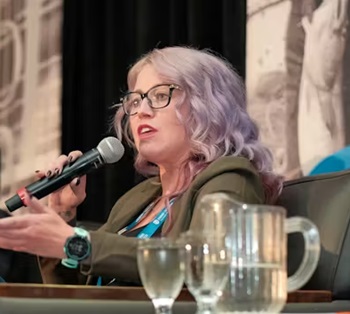 Vibes of positive energy permeated FFAW-Unifor’s recent annual convention in Gander, and the union’s new president hopes to carry that momentum forward into what she envisions will be a new era for the fishery in Newfoundland and Labrador. Dwan Street is the first woman to ever hold the presidency of the union that represents the province’s inshore fish harvesters and plant workers, and she’s ready to roll up her sleeves and get to work now that the convention celebration is over. She’s not interested in discrediting any past executives, but Street said it’s clear there needs to be fresh, new approaches to helping make life better for harvesters and plant workers. more, >>CLICK TO READ<< 08:52
Vibes of positive energy permeated FFAW-Unifor’s recent annual convention in Gander, and the union’s new president hopes to carry that momentum forward into what she envisions will be a new era for the fishery in Newfoundland and Labrador. Dwan Street is the first woman to ever hold the presidency of the union that represents the province’s inshore fish harvesters and plant workers, and she’s ready to roll up her sleeves and get to work now that the convention celebration is over. She’s not interested in discrediting any past executives, but Street said it’s clear there needs to be fresh, new approaches to helping make life better for harvesters and plant workers. more, >>CLICK TO READ<< 08:52
Nova Scotia Lobster Season Faces Wind Delays Again
 Weather conditions push back the much-anticipated opening day for the region’s commercial lobster fishery Strong winds have once again delayed the opening of the commercial lobster season along the south shore of Nova Scotia. Scheduled to commence on Monday, November 25, the season’s launch has been postponed due to weather conditions not cooperating with the fishermen’s plans. The forecast continues to show gale force winds, prompting industry officials to eye Tuesday, November 26, as the likely new opening day. This pattern of weather-related delays is nothing new for lobster fishers who have seen the impact of harsh conditions on their opening days for years. The season is set by regulation to start on the last Monday of November, but as was the case this year, it frequently doesn’t go according to plan. more, >>CLICK TO READ<< 06:56
Weather conditions push back the much-anticipated opening day for the region’s commercial lobster fishery Strong winds have once again delayed the opening of the commercial lobster season along the south shore of Nova Scotia. Scheduled to commence on Monday, November 25, the season’s launch has been postponed due to weather conditions not cooperating with the fishermen’s plans. The forecast continues to show gale force winds, prompting industry officials to eye Tuesday, November 26, as the likely new opening day. This pattern of weather-related delays is nothing new for lobster fishers who have seen the impact of harsh conditions on their opening days for years. The season is set by regulation to start on the last Monday of November, but as was the case this year, it frequently doesn’t go according to plan. more, >>CLICK TO READ<< 06:56






